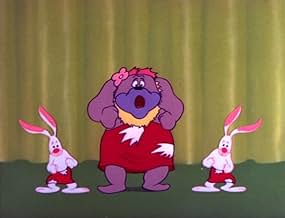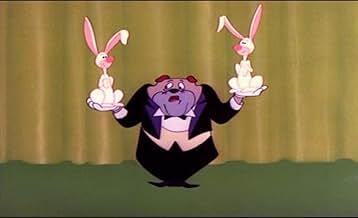IMDb RATING
7.7/10
1.3K
YOUR RATING
A magician seeks revenge against an opera singer for refusing to let him perform his magic act. He then devises what he thinks is a clever plan to enact his revenge with some hilarious resul... Read allA magician seeks revenge against an opera singer for refusing to let him perform his magic act. He then devises what he thinks is a clever plan to enact his revenge with some hilarious results.A magician seeks revenge against an opera singer for refusing to let him perform his magic act. He then devises what he thinks is a clever plan to enact his revenge with some hilarious results.
- Director
- Writers
- Stars
- Awards
- 1 win total
Daws Butler
- Mysto the Magician
- (voice)
- (uncredited)
Carlos Ramírez
- Poochini
- (singing voice)
- (uncredited)
- Director
- Writers
- All cast & crew
- Production, box office & more at IMDbPro
7.71.3K
1
2
3
4
5
6
7
8
9
10
Featured reviews
watch out for the rabbits!
Down and out variety magician gets his own back on haughty opera singer, by changing everything the tenor can sing, technically this is really brilliant, with a soundtrack that must really stretched the MGM orchestra. Unfortunatly the cutbacks in the cartoon department at MGM at the time really show in the lack of backgrounds in this late Avery 'toon, but the quickfire sight gags fall thick and fast to make up for this. As a projectionist working in the cinema, the can containing the print of the film carried a warning that the scene where the hair gets stuck in the gate was an integeral part of the film and should be ignored. Enjoy this great 'toon, and watch out for the rabbits!!!!
equal to all forms of revenge
As long as we understand that "Magical Maestro" contains some politically incorrect scenes, we can enjoy it for the purely crazy, as a sadistic magician plays all sorts of tricks on a snobbish opera singer by changing the guy's persona every couple of seconds. I think that my favorite one was the little kid.
I believe that it was the Klingons on "Star Trek" who declared "Revenge is a dish best served cold." Maybe the magician doesn't go quite that far, but he sure has some funny things up his sleeve! It just goes to show that while Tex Avery may not have been as clever as the people behind the Looney Tunes/Merrie Melodies cartoons, he certainly had some great ideas. Worth seeing.
I believe that it was the Klingons on "Star Trek" who declared "Revenge is a dish best served cold." Maybe the magician doesn't go quite that far, but he sure has some funny things up his sleeve! It just goes to show that while Tex Avery may not have been as clever as the people behind the Looney Tunes/Merrie Melodies cartoons, he certainly had some great ideas. Worth seeing.
exceptionally funny and frenetic
This is a wonderful Tex Avery cartoon. It's very funny and fresh as well as very fast-paced. A singer insults a magician and in turn the magician dresses as the musical director and then uses his magic wand to make lots of crazy and impossible things happen to the singer during the performance. It's completely Tex Avery due to the pacing and humor. There are two problems that keep it from being rated any higher. First, as the 50s arrived, production values on the MGM cartoons (particularly the animation and backgrounds) began to suffer. While this isn't as bad as the later Avery efforts in this regard, the art just isn't up to the standards as earlier Avery classics. Second, it is quite possible that some people could feel offended by the short clip where the singer becomes a black singer (sounding a lot like one of the Mills Brothers). While this isn't the most obvious of racial insults (there were many worse ones during the era), some might not enjoy this or the Chinese characterizations. Don't skip the film, though--that would make you a reactionary idiot.
outstanding
One of the best gags of the toon, IMHO, is the stray fleck on the film. We've all seen them in old films, but nobody would ever expect what happens with this one!
10llltdesq
One of Tex Avery's Best
Let me first state that I think that Tex Avery is to the animated short what Walt Disney was to the feature-length animated film. So many of the conventions of animated shorts were either started by Avery or so effectively used by him that he gave us the cartoon format that we know and, hopefully, love. And Magical Maestro is vintage Tex Avery-gags fired at the viewer one right after another, most of them hilarious. This is excellent work from a master of a highly under-rated art form. Bravo! Encore!
Did you know
- TriviaThe 'hair in the projector gate' gag was so realistic, many projectionists attempted to remove the hair themselves, not realizing it was part of the cartoon. As such, the distributors took to including a warning label on the film's canister to alert projectionists of the gag and how it was an intended part of the film.
- GoofsWhen the concert starts, the white-haired conductor's hair is combed smooth, flipping up in back. The scene cuts to show Mephisto under the stage, looking up toward the white-haired maestro. The white-haired maestro's hair is shaggy, and does not flip up in back.
- Alternate versionsTV prints often cut out the scenes where a man in the audience squirts a barrel of black ink at the opera singer, turning him into a black-face minstrel and where the magician turns the tenor into a Chinese man, a la Gilbert & Sullivan's "The Mikado".
- ConnectionsEdited into Cartoon Planet: The Night the Lights Went Out on Cartoon Planet (1997)
- SoundtracksLargo al factotum
(uncredited)
From "The Barber of Seville"
Music by Gioachino Rossini
Lyrics by Cesare Sterbini
Sung by Poochini
Performer: Carlos Ramírez (uncredited)
Details
- Runtime
- 6m
- Aspect ratio
- 1.37 : 1
Contribute to this page
Suggest an edit or add missing content



























